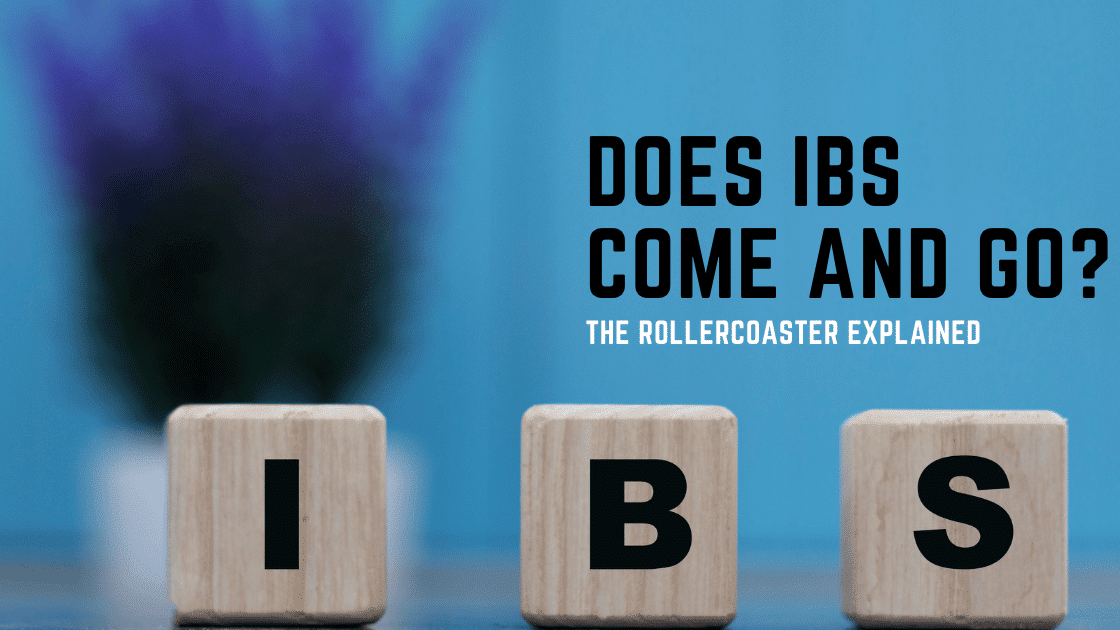Does IBS Come and Go? – The Rollercoaster Explained

I’ve been dealing with Irritable Bowel Syndrome (IBS) for a few years now, and it’s tough. At first, I thought it was just an occasional digestive issue that I would get over soon enough.
But then it returned every few weeks – sometimes even multiple times per day. I’m here to tell you that IBS can come and go, but there’s more to it than that.
The low down is this: IBS comes and goes and is often unpredictable. Abdominal cramps and constipation some days, to bloating and diarrhea the next. Then some days, you may not have any symptoms at all!
If you want the full scoop on why this condition is so tricky – and, more importantly, how you can manage it better – then keep reading.
Exploring My Experience with IBS
Having IBS is a rollercoaster of emotions. It’s one of those illnesses you secretly struggle with, not knowing when the next flare-up might hit, who might be around when it does, and how long it will last.
Sure, there are times when things feel relatively ‘normal,’ and I can enjoy life with friends and family. Then suddenly, something changes, and I’m plunged into a world of pain and discomfort.
It took me over two years of waiting for answers before I was finally diagnosed in July 2021. Now, armed with a confirmed celiac diagnosis and IBS, I’m ready to share my journey and help others who may be going through the same thing.
Finding Support During My IBS Journey
Changing my eating habits to support my IBS journey better was one of the most challenging things I ever had to do. But with expert advice and guidance, I knew I could do it.
Seeking out help from a dietician specializing in IBS was invaluable in helping me identify triggers and slowly reintroduce foods one by one.
Under her guidance, I followed a low-FODMAP diet, which, while difficult to stick to, was more than worthwhile. I couldn’t have gone it alone, and I’m genuinely grateful for her help.
By journaling my experiences and listening to my body, I have built greater awareness and self-regulation regarding my symptoms.
My IBS journey has given me greater insight into my health and has enabled me to find ways to best manage and support it.
Understanding the Importance of Talking About IBS
It’s time to break the cycle of silence around irritable bowel syndrome (IBS). IBS is a common digestive condition that can cause physical and mental distress.
Though it affects millions of people worldwide, it’s often seen as taboo or shameful to discuss, leading many to suffer needlessly.
But discussing IBS openly and honestly is crucial in understanding this condition and finding practical solutions.
By discussing IBS, we can help normalize conversations about GI health, find support, and spread awareness across the globe. Let’s start today – let’s talk about IBS!
Investigating the Various Treatment Options Available for Sufferers of IBS
When I was first diagnosed with IBS, it felt like the diet part of my life was spinning out of control and changing faster than I could keep up with.
But with the help of an IBS specialist dietician, I’ve been able to navigate this tricky terrain and make better dietary choices – one superfood at a time!
While everyone’s situation is different, the key takeaway from my journey is that getting your diet in check is an important step.
Sure, there are some days when I still feel like giving up – but what keeps me going is the hope that treating (and even conquering) my IBS through food and lifestyle changes will be well worth it.
So if you’re trying to figure out your IBS journey, don’t go it alone, and be sure to reach out for professional guidance.
Recognizing Why Diet, Exercise, and Lifestyle Changes are Crucial in Managing IBS
Living with IBS can be a challenging experience, and I know this personally. That’s why I’m passionate about helping other people manage their IBS through diet, exercise, and lifestyle changes.
I’ve realized that these things aren’t just components of good health—they are crucial in managing my IBS.
When I try to eat healthily, get enough exercise, rest, and manage stress, I feel way better than when I don’t.
It doesn’t always work out like that, but it’s an effort worth making.
With some commitment (and a ton of trial and error), I know you can find the same success I have in managing your IBS.
Does IBS Come and Go? – Final Thoughts
Sure, IBS can come and go, but why let it have its way?
With proper nutrition, stress management, and a healthy lifestyle, you have the ability to not only fight against the IBS symptoms that come and go but also take control of your life and make sure those pesky IBS-related problems don’t stand in your way.
So now that you know IBS doesn’t always have to be a bother, get up and take charge!
FAQs
How long does an IBS flare-up last?
Depending on the severity, an IBS flare-up can last anywhere from a few hours to several days. Taking steps to reduce stress and following an IBS-friendly diet can help to minimize outbreaks and manage symptoms more effectively.
What triggers IBS flare-ups?
Various factors, including stress, diet, and medications, can trigger IBS flare-ups. Eating foods high in FODMAPs, such as onions, garlic, legumes, and dairy, can cause symptoms to worsen. Other common triggers include eating too quickly, consuming large meals, drinking carbonated beverages, and consuming high-fat foods.
What can be mistaken for IBS?
Irritable Bowel Syndrome (IBS) is a common digestive disorder, but several other conditions can produce similar symptoms. Celiac disease, food allergies, inflammatory bowel disease (IBD), and certain infections are all possible diagnoses that should be ruled out before an IBS diagnosis is made.
When should you suspect IBS?
Abdominal pain, bloating, constipation and diarrhea are all common symptoms of IBS. See your healthcare provider if some or all of these symptoms are persistent or recurrent, especially if symptoms interfere with your daily activities.
Disclaimer: This content is based on my personal experience as an individual diagnosed with celiac disease and IBS (Irritable Bowel Syndrome) who follows a strict gluten-free diet. This does not constitute medical advice. Please consult a medical professional, nutritionist, or qualified dietitian for personalized, professional advice.






